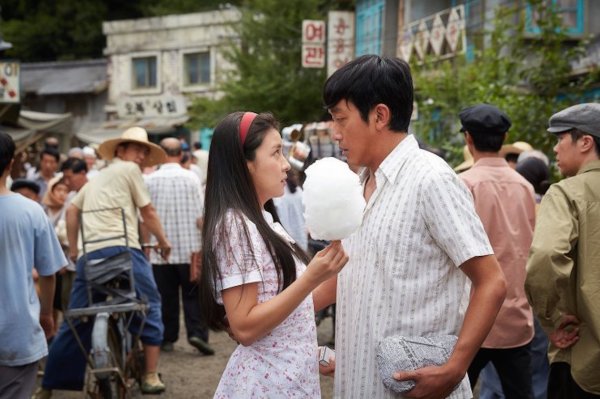In 1953, Gongju City is in the process of rebuilding following the devastating war. Resting for lunch with his fellow workers, Sam-gwan (Ha Jeong-woo (하정우) is ridiculed for his status as a bachelor. Yet upon seeing beautiful Ok-ran (Ha Ji-won (하지원) he becomes instantly smitten and determined to marry her and, after acquiring money through selling his blood and striking a deal with her father, Sam-gwan and Ok-ran are wed. 11 years later, the couple live in relative harmony with their three sons, until a rumour spreads through the village that their eldest boy Il-rak (Nam Da-reum (남다름) actually belongs to Ok-ran’s ex-suitor. As the household is thrown into turmoil by the news, Sam-gwan again finds himself selling blood as the family are forced to redefine their relationships.
Based on Yu Hua’s 1995 novel, Chronicle of a Blood Merchant is Ha Jeong-woo’s second attempt at writing and directing duties following Fasten Your Seatbelt and, while generally competently helmed and produced, the comedy-drama features truly abysmal and outrageous sexual politics, plot holes galore, and an intensely dislikable ‘hero’ in the form of Ha’s Sam-gwan.
The premise of Blood Merchant is centered around raising an illegitimate child, and the narrative consistently attempts and fails to generate comedy from the situation. After hearing the rumours regarding eldest son Il-rak’s parentage, Sam-gwan confronts his wife demanding answers and as Ok-ran reluctantly explains how an ex-suitor forced himself upon her, the film has the gall to focus on Sam-gwan’s suffering as a man who didn’t marry a virgin as well as raise a boy biologically not his own. The narrative intends to generate humour by inferring Sam-gwan is a victim of humiliation rather than focusing on Ok-ran’s suffering from the legacy of sexual assault, a strategy which is completely appalling particularly as a source of entertainment. The fact that Sam-gwan then spends the rest of the film punishing Ok-ran for being raped by sulking as well as virtually disowning Il-rak makes the character particularly despicable and impossible to empathise with. It’s a creative decision from which Blood Merchant never recovers and, following on from Sam-gwan’s almost literal ‘purchase’ of Ok-ran in the first act, the comedy-drama is anything but enlightened.
Things change in the finale however as Blood Merchant opts for the oft-used cliche of poor health in order to bring the family together once more. As both writer and director Ha works hard to generate sentiment though the use of melodramatic conventions which work well, yet as Sam-gwan has behaved so dreadfully leading up to the resolution it is especially difficult to invest in his journey, let alone consider him the hero and saviour of the family. Furthermore the gaps in logic are particularly puzzling, for if any man were to undertake the tasks Sam-gwan does, death would be an absolute certainty.
In terms of star power, both Ha Jeong-woo and Ha Ji-won perform capably. Unfortunately they lack any sort of onscreen chemistry and the narrative doesn’t really create opportunities for it to arise, yet individually they do well despite the lack of characterisation. Their presence in Blood Merchant should guarantee that the film will be a greater success than Fasten Your Seatbelt, though ironically the film isn’t really theirs but young actor Nam Da-reum’s. Nam is the heart and soul of the film and it’s his performance as eldest son Il-rak that makes Blood Merchant watchable and entertaining.
Verdict:
Chronicle of a Blood Merchant is Ha Jeong-woo’s second foray as writer/director, and while he competently helms the comedy drama the shameful sexual politics within the film results in an intensely dislikable lead protagonist. It’s an issue from which the comedy-drama never recovers despite the inclusion of traditional melodramatic conventions in the final act, yet luckily the film is made watchable through the performance of young actor Nam Da-reum.
★★☆☆☆




